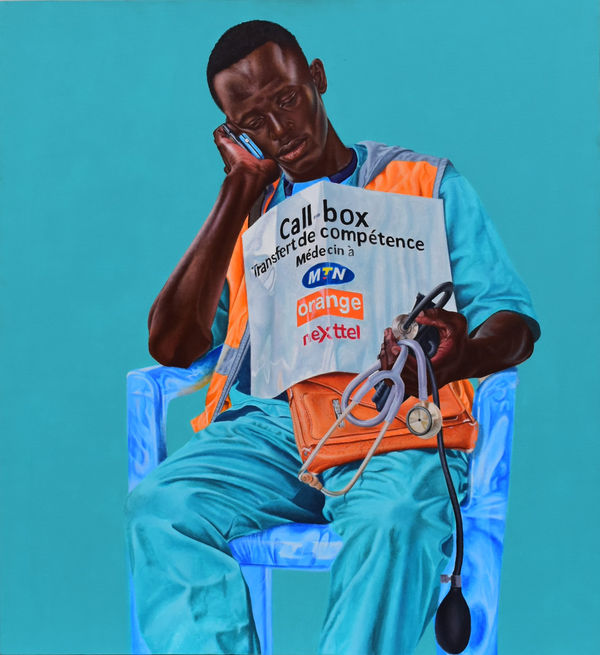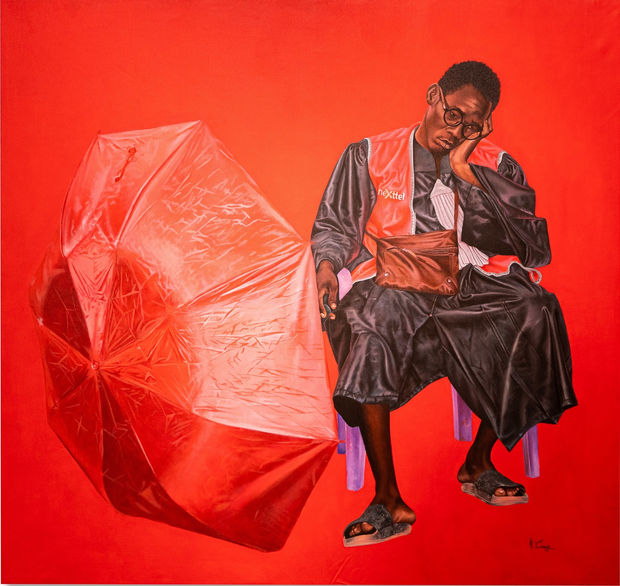For 34-year-old Cameroonian artist Marcel Tchopwe, this expression from Oscar Wild’s 1889 essay is a mantra that resonates throughout his body of work. In this viewing room, we are brought up, close and personal into Tchopwe’s life while finding resonance through his art.
In his latest body of work, the life we see reflected on the canvas is a sad reality of a disappointed generation. The disappointment is inherited from years of systematic injustice, uncompassionate leaders and education systems that are making minimal efforts towards truly decolonising their institutions. Using colour as his closest companion in bringing these works of art to life, Tchopwe colours in the emotion of each qualified graduate with the intention to accurately evoke the spirit of each subject.
Yet what makes this body of work even more important, is the way it compliments his growing collection of portraits. Taking a truly reflective stance into what 2020 has been for many young African graduates, who are overqualified for their current employment status, each artwork has been appropriately titled to speak to the socio-economic position of each subject. Pairing each subject with a uniquely identifiable piece of iconography, Tchopwe has mastered the technique of bringing emotion onto a canvas and re-representing an authentic resonance out of life’s most personal encounters.
-
 Marcel Tchopwecall-box compétence ingénieur, 2022Acrylic on canvas119 x 128.5 cmR 88,000.00
Marcel Tchopwecall-box compétence ingénieur, 2022Acrylic on canvas119 x 128.5 cmR 88,000.00 -
Curatorial Statement
Lethabo GumedeHow do you know when someone is sad? Cameroonian based artist Marcel Tchopwe gets up close and personal with his latest series of artworks that are concerned with the plight of unemployed graduates – an issue all too familiar in South Africa.
Tchopwe is no stranger to illustrating and translating human emotion. In the early stages of his career, he focused his subject matter predominantly on capturing children’s expressions. This, he articulates as being the most authentic form of human emotion. His intention to represent not only the emotion but also the psychology of a portrait is most apparent in his generous use of composition. With each painting, your gaze is directed, with minimal distraction, to the subject at hand which fills the canvas almost entirely.
Having taken an abrupt shift in careers from Engineering to art, Tchopwe has benefitted from being a student of both mentors and life. Being a full-time artist has certainly brought him closer to the human condition, which is why he feels it important to reflect his reality and the reality of those around him. Speaking on his latest body of works, Tchopwe shares the frustration of how many of his peers are qualified Engineers or Doctors but they are not employed.
And so, in reflection, being an artist enables him to be a vessel for society’s joys and worries. How people feel and wear an emotion such as sadness requires much observance, much stillness and much solitude. In addition to the emotions, Tchopwe accompanies his paintings with bold colours and iconography that is popular in the West African region. From large umbrellas, motorbikes or MTN signs. These icons define his style in a way that make it easy to resonate with his work.
In addition, as an artist, it is important for him to speak to the broader socio-political issues not only of Cameroon, but of the African continent as a whole. He is deeply passionate about the African continent and insists that there is no shortage of rich and sustaining resources in Africa. His parting words at the end of our interview were as follows: “If I can give advice in terms of young artists, you need to know that no one will give it to you. You need to get it (for) yourself. You will need to trust what you know, if you want to grow”
And I couldn’t have said it better myself.
-
Marcel Tchopwe finds inspiration in his childhood. Son of soldier, educated with rigor, he had to rebel against his father to do art, an activity he considered reserved for lazy people. He is also inspired by the children he observes in his entourage, children educated with an iron fist, who are not given any respite, violent children who lack respect towards their elders
-
 Marcel TchopweIngenieur on moto-taxi Bali , 2021Acrylic on canvas180 x 160 cmR 98,000.00
Marcel TchopweIngenieur on moto-taxi Bali , 2021Acrylic on canvas180 x 160 cmR 98,000.00 -
 Marcel TchopweDiplome de call-box, 2021Acrylic on canvas185 x 175 cmSold
Marcel TchopweDiplome de call-box, 2021Acrylic on canvas185 x 175 cmSold -
In studio
-
About the artist
Marcel TchopweThrough this work it opens a debate on the place of young people in a rapidly changing society. He questions at the same time the functionality of the social ladder and equal opportunity in a political landscape where bad governance reigns.

Born in 1988 in the Far North, his region of origin, Marcel TCHOPWE is a young artist passionate about drawing and painting. In 2014 he interrupted his studies in geoscience and environment at the University of Ngaoundéré to join the Institute of Fine Arts of the university of douala in Nkongsamba (IBA). In 2019 he graduated with a diploma superior in fine arts. In order to complete his training and immerse himself in the scene artistic, he will flirt with the workshops of artists such as Hervé Youmbi, Jean Jacques Kanté, Salifou Lindou and Jean David Nkot. Even today he is coached by Hervé Youmbi who was his teacher at the IBA and whom he now considers his mentor. His work revolves around the psychology portrait in relation to the question of social malaise where he explores the emotions and human complexity. Thus, whether in painting, drawing or installation, the social ill-being serves as a pretext for him to make a journey through the inner universe of his subjects. It highlights the latent social discontent that accompanies our quest for profit in an era where capitalism increasingly defines us.
Influenced by artists like Lucien Freud, Cristina Troufa, Kevin Peterson or Mich Griffitchs… who are models for him in the exploration of the emotions of men and their abilities to be human. Marcel, in his artistic production paints the portrait psychology of a Cameroonian and African youth evolving in a landscape where reigns a real gap between university training and the job market. He invites us thus to a journey through the interiority of this youth prone to a lack of perspective future. “Unfinished Dream” thus paints a portrait of these helpless young people, a reflection of their own socio-political and economic environment through realistic writing, He opens a window on the daily life of young people formed to be unemployed. He shows in his work young people with the accessories of their trades dreams in full exercise of the small trades become their only escape from survival. On the background in flat tints we perceive this youth abandoned to itself despite the desire to build and participate in the development of their country and their continent. Through this work it opens a debate on the place of young people in a rapidly changing society. He questions at the same time the functionality of the social ladder and equal opportunity in a political landscape where bad governance reigns
The question of emotion is a constant concern in the work of Marcel since his beginnings whether for his paintings or his drawings. He explores different emotions through easy expressions, body postures, gestures, styles clothing or the objects that surround us because they reflect our inner being.
-
Pairing each subject with a uniquely identifiable piece of iconography, Tchopwe has mastered the technique of bringing emotion onto a canvas and re-representing an authentic resonance out of life’s most personal encounters. - Lethabo Gumede












